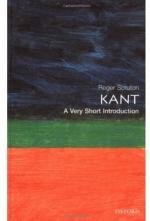
|
| Name: _________________________ | Period: ___________________ |
This test consists of 5 multiple choice questions, 5 short answer questions, and 10 short essay questions.
Multiple Choice Questions
1. Which of the following is true about the statement of "Fido has brown spots"?
(a) The sentence does not include a property.
(b) The act of having is a property.
(c) Fido is a property.
(d) Brown is a property.
2. What type of religious arguments was Kant most interested in?
(a) Arguments for church's relevance.
(b) Arguments against God's existence.
(c) Arguments given for God's existence.
(d) Arguments against church's relevance.
3. What did Descartes argue was the first and most certain piece of knowledge?
(a) One is an intelligent self.
(b) One is a thinking self.
(c) One is a human being.
(d) One has an identity.
4. According to Kant, what does identity imply?
(a) Reality.
(b) Rationality.
(c) Substance.
(d) Causality.
5. Which of the following statements about predicates is not true?
(a) The ontological argument fails.
(b) Existence does not imply a predicate.
(c) Existence is a perfection.
(d) Redness is a predicate of an apple.
Short Answer Questions
1. What did the "transcendental unity of apperception" begin?
2. Which of the following was Kant a determined opponent of?
3. When was "Groundwork of the Metaphysics of Morals" published?
4. Who began the problem of objective knowledge?
5. What was Kant's fundamental question of metaphysics?
Short Essay Questions
1. According to Hume, what is needed to believe or understand something?
2. What did Hume argue about reason?
3. What was Leibniz's argument about reason?
4. Why aren't Kant's arguments about the unity of apperception sound?
5. Describe phenomena and noumena.
6. Why did Kant believe the present was the most privileged time period?
7. Why do you think Kant wanted to believe in the existence of the soul from a philosophical standpoint?
8. How did Kant react to the arguments from Hume and Leibniz?
9. Why did the second version of "Critique of Pure Reason" fail?
10. What did Kant think about marriage?
|
This section contains 672 words (approx. 3 pages at 300 words per page) |

|




